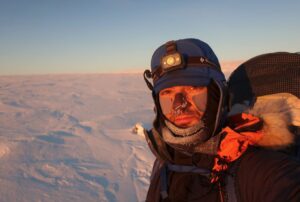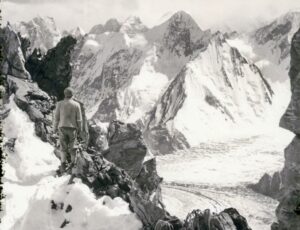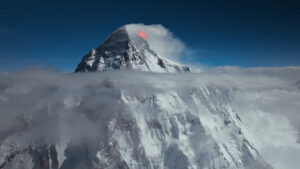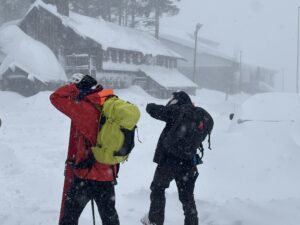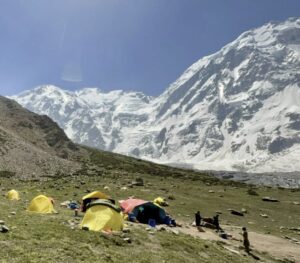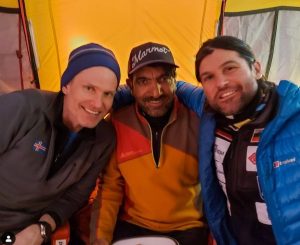The Latok group of summits, clustered within the Karakorum of Pakistan, are renowned for their extreme technical difficulty. A Russian team of Gukov, Shamalo and Kashevik can bear witness to the dangers posed after a particularly brutal attempt to summit the 7,145m Latok I in August. Valery Shamalo is now in the process of recovering after a number of operations: He has lost his toes and parts of all his fingers.
Valery Shamalo, an experienced climber famous for his extreme routes,
is currently undergoing treatment at the Dzhanelidze
clinic of the Institute of Emergency Care in
St. Petersburg. On September 9, he arrived by
plane from Islamabad, and was taken there by ambulance.
Valery is now in the process of recovering after
a number of operations. Despite having lost weight, he is reportedly
still cheerful and can even walk a little.
Our friends over at Russian Climb went to interview Shamalo and passed it on to us at ExWeb. The full interview translated from Russian can be read below:
Accident on the mountain
I actually ascended to 6,700m quite normally, though climbing was a bit tough. Well, I thought I was older and untrained… I coughed and wheezed, nothing unusual. Then it turned out I had pneumonia. I had no idea, but we were all wet as it had been pouring all the time.
We expected that it would take about 10-12 days to go through the route, but it turned out to be more difficult. The ridges were impassable, which slowed down the climbing process. By the 11th day, we were running out of gas. The remaining gas would be enough for just one or two days. The question was, how might we manage to reach the top and return?
We somehow thought that the upper part would be easier, but there were snow slopes 80 degrees steep. At the exit to the summit crest, with 200-250m to go, we couldn’t see anything either from below or from the side. Later, it turned out we had only passed a single pitch out of 250m. The rocks were on the sidelines but it was impossible to reach them. Even two weeks wouldn’t have been enough to overcome those 250m.
It was then that we decided to go down. It took us two days. I had swollen lungs. The pneumonia had started earlier. Most likely, I was infected with some bacteria, or I had drunk water from a stream, I don’t know. The infection had penetrated into my lungs. The rest of the group didn’t drink from that stream. Then there was the swelling. We had neither water nor gas. My body began to lose control over the rest of my senses. One lung was enough for the climb-down, but already I found that I had got frostbite on my legs and hands. Anton got it on his legs, and Sasha got frostbite a little bit too.
When we were at the foot of the mountain, we threw some of the things away, including medicines! We shouldn’t have done that! We were only thinking of going down alive. When we were on the mountain, we had called our porters for help. We needed to take off from the camp right away and go in the opposite direction. When we descended, the porters were waiting for us at the base. There was a guide and a cook. We sent some people to fetch our abandoned things. They brought everything back.
It took us three and a half days to reach civilization. I could walk normally on the first day. Anton was in a worse state, he was put on a horse. We decided to throw away some of the kitchen items (we agreed that the porters would go back for the abandoned things for an additional fee). I could still walk for one more day but my lungs – not my fingers – made it too hard for me. I fell behind. They sent a horse for me so that I would ride it to the place for overnight stay. On the third day, I was again on foot until we found someone’s grazing horse at noon. We decided that I would ride it.
It turned out to be a horse from the plains. It was not used to mountains, and was hardly walking in steep areas. Besides, there was no saddle. The porters twisted a blanket, tied it, and made something like stirrups. It was painful to hold them with frozen hands, but I had to or I would fall. The horse was moving all the time. It was too exhausting. I even flew four meters together with the horse! Luckily, I managed to take my legs out of the stirrups and jump off. I didn’t even break anything. The porter who was leading the horse was shocked. He was frightened to death. Because he was not a local himself, he gave the horse to a local porter. Things improved. However, I was still too tired. I was walking by myself on the last section, walking slowly, behind the rest of the group. For all these days I walked without painkillers. On the second day, on the rise, Sasha injected me with DXM so I wouldn’t die from pulmonary edema.
In a hospital in Skardu, I was put under an IV for the night. The next day we flew to Islamabad. Anton’s visa was expired, they extended it for two more days. I was lying at the hotel when a doctor from the Russian embassy was called to me. My fingers were all black. The doctor was very worried. Apparently, I had survived the pneumonia and I was already feeling better on the airplane. In St. Petersburg, the ambulance took me to the Dzanelidze Institute, where they pumped the liquid out of my lungs. In regards to my fingers, they tried to leave as many of them as possible…
Sasha Gukov was lucky and had no amputations. Anton lost one phalanx on his leg, part of his thumb, and a couple of small pieces. Valery lost his toes and the first phalanx of his fingers.
We visited Valery at the hospital with Volodya Shopin. He knows the value of fingers.
—
Interviewed by
Elena Laletina
for Russian Climb.
Previous:
Karakorum winter battle take 1: Russians have landed in Pakistan
Nanga Parbat Basecamps Established, Climbing Begins
Russian Team of Nanga Parbat, Route Decided

